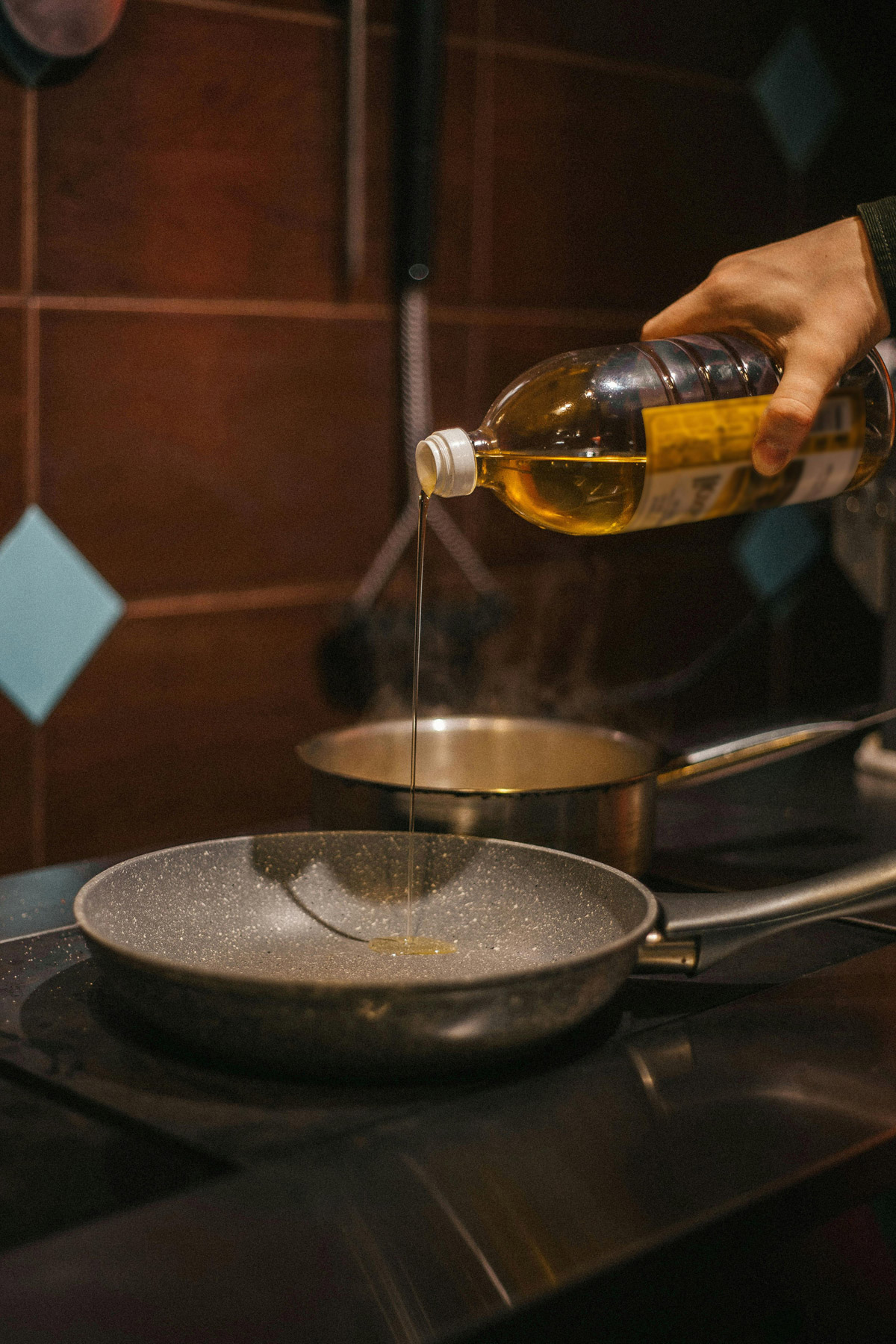
Brain worm-addled Health and Human Services Secretary Robert F. Kennedy Jr. has made many incorrect and half baked claims. Jr’s belief that “seed oils” are unhealthy is lower stakes than the misinformation he spreads about vaccines. It’s still wrong-headed and could contribute to poorer health, however. The Associated Press reviewed the research and spoke to a nutrition science professor who said research shows that plant-based oils are actually better for us, in certain contexts, than beef tallow or butter. When “seed oil” is part of a diet high in ultraprocessed food it can of course be bad for us, but when used as part of a balanced diet vegetable oil can be a better choice than butter or lard.
I read that AP article and was still a bit confused about the differences between “seed” oil and beef tallow so I’d also like to quote an article by The Cleveland Clinic, which breaks down why these types of oils have been demonized.
Robert F. Kennedy Jr., the new health secretary, has said Americans are being “unknowingly poisoned” by seed oils and has called for fast-food restaurants to return to using beef tallow, or rendered animal fat, in their fryers instead.
In response to consumer concerns, some food-makers have stripped seed oils from their products. Restaurants like the salad chain Sweetgreen have removed them from their menus…
The seed oil discussion has exasperated nutrition scientists, who say decades of research confirms the health benefits of consuming such oils, especially in place of alternatives such as butter or lard.
“I don’t know where it came from that seed oils are bad,” said Martha Belury, an Ohio State University food science professor…
Simply put, they are oils extracted from plant seeds. They include eight commonly targeted by critics: canola, corn, cottonseed, grapeseed, soybean, sunflower, safflower and rice bran.
Seed oils are typically made by pressing or crushing the seeds and then processing them further with chemicals and heat to remove elements that can leave the oil cloudy or with an unpleasant taste or odor.
The result of such refining is a neutral-tasting oil that is inexpensive, shelf-stable and able to be heated at a high temperature without smoking, said Eric Decker, a food science professor at the University of Massachusetts Amherst…
“Scientists who study omega-6 and omega-3 think we need both,” Belury said. “Seed oils do not increase acute or chronic inflammation markers.”
In addition, research from the American Heart Association and others has consistently shown that plant-based oils reduce so-called bad cholesterol, lowering the risk of heart disease and stroke, especially compared with sources high in saturated fat…
That’s found in new research from Brigham and Women’s Hospital scientists as well. A study of more than 200,000 adults over more than 30 years released Thursday found that people who ate the highest amounts of butter had a 15% higher risk of dying than those who ate the least. People who ate the most plant-based oils — including seed oils — had a 16% lower risk than those who ate the least.
Dr. Daniel Wang, who led the research, said new modeling data suggests that swapping less than a tablespoon a day of butter for equal calories of plant-based oils could lower premature deaths from cancer and overall mortality by 17%. Such a small daily change could result in “a substantial benefit,” Wang said. – From AP
Seed oils aren’t necessarily good for you. But the real reason they’re considered so bad for you is related to how they’re most often used: in processed foods and ultra-processed foods.“Most seed oils are utilized in the form of packaged foods, fast foods and eating out,” Zumpano says, “and that’s where most of the danger lies.”
But you’re most likely to consume seed oils when you’re eating something that’s already pretty bad for your health — something that’s also full of fat, sugar and sodium…
Occasionally frying your breakfast potatoes in a little bit of sunflower oil isn’t going to throw your body into disarray. But there are some caveats.
“It’s important to note that these oils shouldn’t be cooked at high temperatures or reused,” Zumpano cautions. “That really worsens their negative effects.”
And if you want to stop consuming seed oils entirely, she says there are no downsides to doing so.
“When people say they’re cutting seed oils from their diet, what they really end up doing is cutting out many processed foods,” she continues. “I think that’s why we often hear about seed oils as being so bad for your health. But the reality is that it’s less about the seed oils themselves and more about the fact that they’re so often found in ultra-processed foods.” – From The Cleveland Clini
[From AP and The Cleveland Clinic]
I learned some things from The Cleveland Clinic article particularly and am going to try to cook with avocado oil. I think this quote sums it up “the reality is that it’s less about the seed oils themselves and more about the fact that they’re so often found in ultra-processed foods.” (This article, from MassGeneral hospital, has a very concise summary if you’re looking for just the highlights.) Most of us could benefit from eating less highly processed foods and less fried foods, but that’s not what this debate is about. What’s more is that using beef tallow to fry fast food isn’t the answer for so many reasons. There’s no proof that it’s “healthier,” as the AP’s expert noted, it doesn’t accommodate people who follow a plant-based diet, people who don’t eat meat for religious reasons, or the growing number of us who are allergic to beef and pork. It’s also much more taxing on the environment to use animal-based fats.
I hate that these people fixate on one thing, don’t examine the context, and then decide something is “bad” or “good.” We’re living in the Idiocracy era, except the dumbasses in charge of everything aren’t just stupid, they’re evil.
Photos credit: Max Avans, Athena Sandrini and Bulat Khamitov on Pexels













Avocado oil is excellent and can come flavoured with Blood Orange, Lemon and Lime which are great for salads. For years couldn’t eat eggs without terrible stomach issues and recently found out that egg farmers often give the hens a small amount of penicillin in their water, and I’m allergic to penicillin, which is why the eggs made me sick. However, it’s a heavily regulated industry and you can trust that eggs labelled antibiotic free are just that. And cows are given birth control in feed lots- which counts as a hormone. So we eat that when we eat beef. A friend gets it and feeds it to her barn cats to keep them from coming into heat.
Eat whole foods. Not too much. Mostly plants.
Michael Pollan, brilliant food writer. Love it.
I wouldn’t be surprised if one of the ways that seed oils are processed – a specific chemical added at certain parts of the process at some plants, for example – is actually bad for us, but good luck as a consumer finding that all out. I still eat them since I can’t always find a delicious olive oil that I like (sometimes it’s just way too peppery and abrasive tasting, and yes I am using virgin olive oil). American food is frequently pretty effed, but the nightmare duo of Mr Brainworms-And-Heroin up there and GOP big business aren’t going to solve it. He’s just here to muddy the waters and grant more credence to crazy people who think carrots aren’t food.
Thanks for explaining the information about seed oils! Another reason some people choose plant oils over animal based oils is for ethical reasons. Animals are sentient and can experience pain and suffering just like our pets we love. If you can choose plant based it is kinder to animals and the planet.
And I will continue to use my butter and lard as I please guilt free, thank you. 🧈